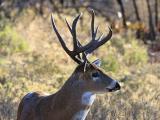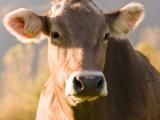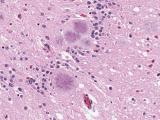Jan 6, 2004 (CIDRAP News) Genetic tests have confirmed that the cow with the first known case of bovine spongiform encephalopathy (BSE) in the United States came from a herd in Alberta, the US Department of Agriculture (USDA) announced today.
"We now have DNA evidence that allows us to verify with a high degree of certainty" that the cow originated from a dairy farm in Alberta, Dr. Ron DeHaven, the USDA's chief veterinary officer, said at a news briefing this afternoon.
DeHaven said DNA from the cow's brain matched DNA from semen of the bull that farm records indicated was the cow's sire.
Dr. Brian Evans, chief veterinary officer for the Canadian Food Inspection Agency, who also spoke at the briefing, said genetic tests conducted in Canada "fully complement and reflect those returned from the US laboratory."
USDA officials had previously said they believed that the cow, which was in a herd at Mabton, Wash., before its death, came from Alberta, but they couldn't be certain without the DNA tests.
DeHaven, responding to a question, said, "I think it's premature to draw any sweeping conclusions from this one piece of information" about the risk of BSE in the United States versus the risk in Canada. "The epidemiologic investigation needs to continue," he said. "She [the cow] did come to us with a number of other animals from the same herd."
Evans said the Alberta herd that the cow came from no longer exists because the owner sold all his cattle in 2001. The cow was one of 81 cattle from the Alberta farm that were exported to the United States in September 2001, he said. Another 17 cattle from the farm were held back, and some were sold into the US in a second wave later, he said. A small number of cattle remained in Canada and are now "under detention" there, Evans reported.
Evans said the finding that the infected cow came from Canada isn't surprising. Given that some British cattle were exported to North America in the 1980s, when BSE was fairly widespread in Britain, "we've always accepted the reality that a small number of additional cases couldn't be ruled out," he said.
DeHaven said that because of the integration of the US and Canadian beef industries, BSE is not an American or Canadian issue. "It's a North American issue, has been, continues to be, and really became a North American issue on May 20 [2003] with the finding of the first North American case" in Canada, he said.
"Despite wherever this cow may have originated from, US beef remains safe," DeHaven said.

















